 A HAVEN
FOR INVESTORS A HAVEN
FOR INVESTORS |

In the movie Independence Day, at the end of the
film, the main character asks his family: "Where
would you like to be when the world is coming to
an end", without missing a bit, his teenage
daughter Jessica answers: "I want to be in
Fiji", he asked Jessica: "Why would you
like to be in Fiji at the end of the world?"
and she said that in Fiji everything comes fifty
years later. Investor confidence has not taken fifty
years to come to Fiji, it has come right away. Fiji
likes to pride itself as an investor's paradise
and over the years, have introduced packages it
hope will attract investors and their money. It
wants to roll out the red carpet to any investor
and it was with this in mind that it established
the Fiji Trade and Investment Bureau (FTIB). The
Bureau aspires to be the one-stop shop for investors
by spearheading promotional activities, providing
advisory and information services and export marketing
information and acting as a liaison between government
and private sector. Its work is provided for in
the Foreign Investment Act that which offers the
regulatory framework under which investors operate.
The Act dictates certain sectors of the economy
that are reserved for Fiji citizens and national
enterprises only and the FTIB(www.ftib.org.fj) is
there to guide investors along. The Act for instance
dictates the FTIB issues the foreign investment
certificates to all new proposals within 15 working
days of receiving complete proposals. Says Jesoni
Vitusagavulu, Chief Executive Officer of FTIB: "Some
of our procedures need to be streamlined in order
to expedite the approval process." Narube,
Governor of the Reserve Bank, adds: "A stable
financial and economical environment is what attracts
investors and exporters. We are providing a stable
environment and I think that has helped exporters
in the last two years, specifically the measures
that we have taken to facilitate the access to credit
and to funds by exporters". Vitusagavulu
argues people remember Fiji as a wonderful destination.
"Recently", he says, "Mary
Cheney, the daughter of Dick Cheney (US Vice President),
came to spend her holidays in Fiji. She went to
Beqa Island, where the Sawau tribe walks on fire
and she stayed at the Marlin Bay Resort. That speaks
well of how secure is this place. Fiji is back in
the minds of the people as a good place to go",
Vitu assures, "it is secure as it is in
the middle of nowhere. Fiji's investment environment
has greatly improved, investor confidence is back
and the people out there ought to be excited about
doing business in or with Fiji".
 Boom in
Tourism Boom in
Tourism |
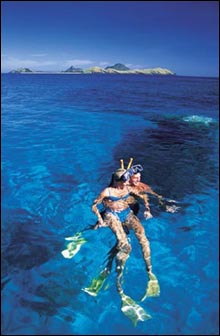
Nowhere is the excitement building as an industry
that holds a lot of promise for investors than Fiji's
tourism sector. With indications that gross earnings
may very well peak at $1 billion FJD (@ $500m USD)
in 2007, the Fiji Government, according to its Trade
and Commerce Minister Tomasi Vuetilovoni is going
out of its way to promote growth. "International
hotel chain, Novotel will be built involving Accor
in partnership with Air Pacific and the Colonial
Group near Nadi Airport," says Vuetilovoni.
"Also starting up early next year is the
Hilton at Denarau, further expansion of Trend West,
and the Denarau Sheraton Villas. As we move south,
to a place called Momi Bay, and also starting next
year will be the Meridian Hotel." A major
new development is at Natadola, which is regarded
as the best beach in Fiji. The government has already
commenced its part in providing the infrastructure
like the road, the water supply and the electricity
supply with an initial investment of $10 million
FJD (@ $5m USD). Six Continents Hotel and Shangri-la
are two of the early starters on the beautiful site.
That everyone must share the earnings from the tourism
industry is the fervent wish of Fiji's Tourism Minister,
Pita Nacuva. "We have a strong culture and
strong traditions that must be kept and this is
also good for tourism. Culturally, locals and tourists
learn form each other and this is enriching in both
ways." Foreign Minister Tavola says being
in the middle of the ocean from big landmasses,
away from big concentrations of population, is providing
a buffer zone to Fiji. "People see us as
a safe haven. Now that the economy has recovered
as well as our politics, Fiji is a lot more attractive
in terms of tourism." Successful local
business executive and owner of the Prouds chain
of duty free stores in Fiji, Mahendra Patel believes
the Fiji Government has a forward looking policy.
"The Government is very pro-active in the
sense that it is listening to the business people,
who are the engine for the economy. The hotel developments
coming up, like the Hilton or Novotel, or the proposed
infrastructure at Natadola, are all good indicators",
Patel says. Fiji's tourism industry will benefit
enormously from the $25 million FJD upgrade at Fiji's
two international airports of Nadi and Nausori (@
$12.5m USD). Carried out in line with a master plan
drawn up by Singapore Airport Consortium - architect
of Singapore's Changi International - the upgrade
will see more space for shops, restaurants and internet
cafes, faster processing of passengers and other
customer friendly initiatives.
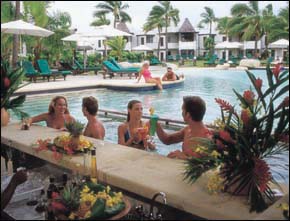
 Mahogany
is Fiji's Green Gold Mahogany
is Fiji's Green Gold |
Undoubtedly, Fiji recognises the value of its matured
mahogany forests and it will soon search for a strategic
partner in the harvest and the process of the lucrative
timber. Foreign Minister Tavola believes Fiji has
the largest mahogany plantation in the world, a
billion dollar industry that is coming on stream
now. Tropik Woods Limited processes the pine forest
and exports pine chips to Japan. For indigenous
timber, Fiji has Fiji Forest Industries (FFI) and
Valebasoga Tropic Boards.
 Fiji Talks
to the World Fiji Talks
to the World |
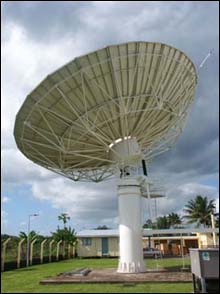
Fiji's links to the Southern Cross cable opens up
another lucrative industry for the island nation:
IT-based industry. Local business leaders believe
the cable link as well as Fiji's low labour costs
and its highly skilled workers make it a good investment
haven for IT operations. Selecting Fiji as host
of call centres could be an alternative. While FINTEL
admits that the response so far from reputable call
centres has not been as expected, the company is
still confident of the potential Fiji has to offer
in this area. Its work has been boosted with ANZ
Bank's decision to set-up a call centre in Fiji.
"Fiji has an English speaking population
and the labour rates are very low at the moment,"
explains FINTEL's Chief
Executive, Philip Richards. |
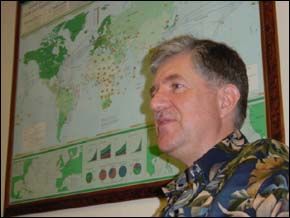
"We have good communications in Fiji, high
capacity, plenty of space and land available for
renting at good rates". FINTEL
itself has lots of land which could be used for
Call Centres. We can provide the building, the land
and the connection to the SCCN very quickly. We
have plans already drawn up, the architect's drawing
and everything ready to be used for Call Centres.
There is no barrier at the moment to settle a successful
Call Centre in Fiji. The Fiji Trade and Investment
Bureau says it has been receiving queries from call
centre companies. "We are talking to ACS
(Accessories Computer Services), a large American
company", says Bureau CEO Jesoni Vitusagavulu.
"They have bought the Call Centres operations
for the National Processing Corporation (NPC) and
they are going to do Data Processing for Qantas
and Air New Zealand here in Fiji." A New
Zealand consultant identified the IT industry as
one that holds a lot of promise for Fiji. With the
Southern Cross cable, low wage rates, and an English-speaking
workforce, the platform has already been created.
"We speak with no accent, so we are easily
understandable. We also have another advantage,
when Europe is sleeping, we could be doing the processing
and when the sun rises they would have what they
want," argues Vitusagavulu. "We
have about 13,000 school leavers every year, an
abundant labour force for an intensive labour industry.
When ANZ was recruiting the people to work in their
Call Centres, they were very happy with the quality
of the workforce."
 Stepping
Stone onto the Pacific Stepping
Stone onto the Pacific |
Equally exciting is an ambitious plan by FINTEL
to introduce a fibre optic cable around the South
Pacific that will link up island countries with
Fiji. This will give the South Pacific countries
a lot of capacity on global applications like all
the Tele-services, Tele-medicine, Tele-education,
ICT, and others. FINTEL
says under the plan, everything will be complemented
by the satellite networks which will also be used
for domestic distribution. The project is estimated
to cost $900 million FJD (@ $450m USD) and link
up 10 countries. FINTEL is currently talking with
potential financiers including the Asian Development
Bank. "We obviously need funding for this
project and we are active in pursuing this as an
infrastructure development for the South Pacific
Region. It is conceived as a development project",
FINTEL's CEO Mr. Richards
explains. "We have already spoken to the
European Investment Bank and other potential funding
agencies. We obviously need to consider local governments,
Telecom carriers and Telecom operators to contribute
financially to the project". Richard says
the reaction so far to the ambitious project has
been very positive. He has raised the idea with
a number of Telecom carriers in the South Pacific
and some governments. "The feedback I have
is quite affirmative. A project proposal paper will
be distributed to governments and Telecom operators/carriers
in the South Pacific to formally seek their views
on the project. Preliminary discussions with the
Asian Development Bank (ADB) were positive but the
ADB will require financial and traffic projections
before the next stage discussions are held."
 Fiji, the
Hollywood of the South Seas Fiji, the
Hollywood of the South Seas |
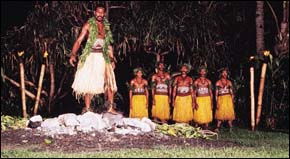
An offshoot of the IT industry is the audio-visual
industry that Fiji has identified as another sector
with a lot of potential. To help guide the development
of this new sector and to assist investors, the
Fiji Government has established the Fiji
Audio Visual Commission. The Commission believes
its best-practice tax incentive, best copyright
and anti-piracy legislation that are in line with
the World Intellectual Property Organisation and
anti-vertical integration controls make Fiji a paradise
for film and television producers. The presence
in the country of a large number of Hindi and Chinese
speaking population should also be an attraction
to Asian film companies, including India's Bollywood.
For FAVC Chairman, Joe Mar, "Filmmakers
can come in and run their productions, they do not
have to worry about double taxation as we have a
rebate system, which is 15% for a certain minimum
amount of expenditures spent in Fiji. Second to
none the tax incentives are clearly one,"
says Mar. "Ideal locations with our beaches,
jungles, rivers and rugged tropical mountains. We
have a competitive advantage to other countries
because of our culture, which is unique as a result
of our isolation. Be it for movies or for documentary
type of production, it offers great attraction in
a film. We also speak English as the first language.
We have a lot of budding actors and actresses that
can be available locally without having to import
them from abroad."
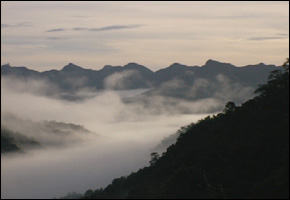
Mar, who is also executive chairman of the Fiji
Electricity Authority, says the Studio City, in
its ultimate conception, is a one-stop shop film
and audio production centre with tax-free incentives
for those who settle in it. Overseas employees earning
over $100,000 FJD (@ $50,000 USD) a year, especially
big stars, are tax exempt under the Act. "The
Southern Cross cable network which connects through
Fiji is a big conduit that allows us access to the
rest of the world via electronic means; it is the
door to the rest of the globe. The Southern Cross
Cable, for instance, is capable of running over
a 1,000 full-length movies simultaneously. This
is a major opportunity for Fiji's economic growth,"
concludes Mr. Mar.
The selection of Fiji for the shooting of Brooke
Shield's Blue Lagoon and Tom Hanks's Castaway
has put the country into the world map of film making.
But the Fiji
Audio Visual Commission is saying Fiji is not
only a haven for tropical island shooting. Its geography
also features massive jungles, rivers and waterfalls.
Some of these were discovered when the world acclaimed
Eco-Challenge was hosted in central Viti Levu, Fiji's
main island. Construction work on Fiji's first studio
city, a 2200-hectare site at Yaqara in northwest
Viti Levu, is scheduled to begin soon. A consortium,
Paradise Entertainment Limited, has the sole right
to develop and operate the city. Foreign
Minister Tavola says the Audio Visual Commission
has been doing a lot of promotion overseas which
has generated a lot of interest. "Their
representatives were with us in the United States
recently. They have been going to the Cannes Film
Festival a couple of times and they have been talking
to a number of studios in Hollywood," Tavola
says. "When we were in LA, we went to Fox
Studios and Sony Studios and spoke to film producers
and directors to come to Fiji and film here. We
have had some filming done already in Fiji and the
people were impressed." |

